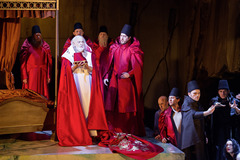| Opera Reviews | 28 April 2024 |
A flawed Foscariby Moore Parker |
|
| Verdi: I due Foscari Theater an der Wien 20 January 2014 |
|
|
Plácido Domingo opened rather tenuously as Francesco Foscari, lending the impression that this ageing operatic figure was being typecast - vocally and otherwise. His opening scene ("Eccomi solo alfine...") exposed a porous, brittle - almost bufforesque - timbre, lacking the legato and plasticity required for the noble aria which follows. The instrument really now appears to require a mezzo forte in order to respond, but - as later moments would prove - can still produce some impressive tones at that dynamic level and beyond. Act two did bring definite improvement, ultimately blossoming into a gripping and moving Act three finale in which Domingo pulled out all the stops - at times rekindling memories of the inimitable heyday magic, and culminating in the anticipated standing ovation. Arturo Chacón-Cruz (Jacopo Foscari) is in possession of a generous lyric tenor and an appealing stage presence. His vocal stamina, and a healthy, brilliant range above the stave are definitely impressive. However, his forced, metallic-sounding mid-range and unsophisticated phrasing greatly detracted from the performance - faults, possibly (if only in part) associated with an overall musical concept in this production which appeared focussed on volume rather than quality. Davinia Rodriguez cut a slender and sleek stage figure who well wears her extravagant costumes, and who strides Lucrezia's testing lines with endurance, if vocal inconsistency. In her favour were precise intonation and a surprisingly accurate agility. Roberto Tagliavini was an imposing Barbarigo - his slender but sonorous bass, solid technique, and striking stage presence show undoubted potential. The Arnold Schoenberg Chor has seen more successful productions, here neither sounding Italianate nor genuinely rich in tone for Verdi's demands. In the pit, James Conlon seemed bent on driving this lesser-known score with a whip rather than a baton, hectoring rather than dramatic, and somehow emphasizing the weaknesses rather than strengths of this early Verdi score. I had the (mis)fortune of Muti's Rome interpretation of last Spring still ringing in my ears. The production was rather slickly conceived (with venues ranging from LA to London) and strongly augmented by Mattie Ullrich's imaginative and luxuriant costumes, cleverly hinting at "period" in their grandeur, but with touches of excess which might have come from the hand of Vivienne Westwood or Donata Versace. The basic set depicted Venice in a state of collapse. A bridge (feasibly the Ponte dei Sospiri) spanned the stage. Simple roller plinths provided various altitudes for ensemble scenes, while gruesome metal cages suspended on chains housed the torture victims. Francesco was well-served by an elevated sliding raked stage which highlighted activity nicely for the veteran lead while providing scenic variety. Less appealing were the projected information texts on screens during scene changes and instrumental passages, and the rather trite backdrops to the transvestite "ballet" in Act three's street carnival. Bruno Poet's lighting was particularly atmospheric and effective throughout. A valuable - if somewhat flawed - addition to this season in the Theater an der Wien. |
|
| Text ©
Moore Parker Photo © Herwig Prammer |

 On
its intercontinental tour (with Covent Garden still to come) this I
due Foscari presented a welcome opportunity to see a staged version
of an all-too-neglected Verdi opera, with the additional curiosity factor
of a legendary tenor pursuing his newly-beaten path of Verdi baritone
roles.
On
its intercontinental tour (with Covent Garden still to come) this I
due Foscari presented a welcome opportunity to see a staged version
of an all-too-neglected Verdi opera, with the additional curiosity factor
of a legendary tenor pursuing his newly-beaten path of Verdi baritone
roles. 





